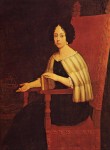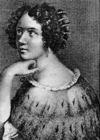- Elena Cornaro Piscopia, artist unknown 18th C.
- Elena Cornaro Piscopia
by Koren Whipp
Elena Lucrezia Cornaro also Cornaro-Piscopia (1646-84), philosopher and the first known woman to earn a Doctor of Philosophy. She was born in the Republic of Venice, the fifth daughter of Giovanni Battista Cornaro-Piscopia, Procurator of St. Mark’s, the second highest office only to the Doge, and Zanetta Giovanna Boni.
Cornaro began her academic studies at the age of seven. She became proficient in several languages; Latin, Greek, Hebrew, Arabic, Chaldaic, French, Spanish and English, earning her the title Oraculum Septilingue (Master Oracle) of seven languages besides her native one.[1] By the age of seventeen, she was an expert musician. She composed music and played the harpsichord, the clavichord, the harp, the violin.[2]
She graduated from the University of Padua and was awarded the Doctorate in Philosophy on 25 June 1678. Cornaro’s doctoral examination attracted much attention. The throng of spectators required that the examination be moved from the University Hall to the Cathedral in Padua. During the examination, Cornaro spoke for more than an hour in Latin, explaining difficult passages of Aristotle’s work, and left her examiners so stunned that they dispensed with regular procedures and granted her the degree of doctor by acclamation.[3]
After receiving her degree, she refused several advantageous marriages, relinquished her place in Venetian society, and in 1665 became a Benedictine Oblate, but did not become a nun. She wanted to be away from Venice to continue to learn as she could.[4] She lived out her remaining years focused on learning and ministering to the poor.
Cornaro died at aged thirty-eight on 26 July 1684 of what is now believed to be tuberculosis.[5] A funeral oration was delivered by a fellow academician in which Cornaro’s fine qualities were extolled.[6] The text of the oration was published in Brescia shortly after its delivery and a description was published in Padua in 1686, dedicated to the Republic of Venice.[7] She was buried in the Church of Santa Giustina at Padua. In 1895 Abbess of the English Benedictine Nuns of Rome, Mathilde Pynsent, had Cornaro’s tomb opened and her body was reburied in a new casket and a tablet extolling her virtues was placed at her head.[8]
[1] E. Probst, Superfrauen. V: Wissenschaft (Norderstedt: GRIN, 2001), 153.
[2] Nicola Fusco. Elena Lucrezia Cornaro Piscopia, 1646-1684 (Pittsburgh: U.S. Committee for the Elena Lucrezia Cornaro Piscopia Tercentenary, 1975), 31.
[3] Elgin Eckert, “Helena Lucretia Cornaro,”Mary Hays, Female Biography; or, Memoirs of Illustrious and Celebrated Women, of All Ages and Countries (1803). Chawton House Library Series: Women’s Memoirs, ed. Gina Luria Walker, Memoirs of Women Writers Part II (Pickering & Chatto: London, 2013), vol. 7, 438-39, editorial notes, 480-81, on 480; and D. M. Robin, A. R. Larsen, and C. Levin (eds), Encyclopedia of Women in the Renaissance: Italy, France, and England (Santa Barbara: ABC-CLIO, 2007), 292.
[4] Fusco. Elena Lucrezia Cornaro Piscopia, 34.
[5] Jane Howard Guernsey. The Lady Cornaro, Pride and Prodigy of Venice (New York: College Avenue Press, 1999) 70.
[6] Mary Hays, “Helena Lucretia Cornaro,” Female Biography; or, Memoirs of Illustrious and Celebrated Women of all Ages and Countries (6 volumes) (London: R. Phillips, 1803), vol. 3, 436-38, on 437.
[7] Eckert, “Helena Lucretia Cornaro,” vol. 7, 438-39, editorial notes, 480-81, on 481; and A. Chalmers, The General Biographical Dictionary Containing an Historical and Critical Account of the Lives and Writings of the Most Eminent Persons in Every Nation Particularly the British and Irish from the Earliest Accounts to the Present Time the General (London: J. Nichols, 1816), vol. 25, p. 148.
[8] Fusco. Elena Lucrezia Cornaro Piscopia, 45.
Bibliography
Alic, Margaret. Hypatia’s Heritage: A History of Women in Science from Antiquity through the Nineteenth Century. Boston: Beacon Press, 1986.
Chalmers, A. The General Biographical Dictionary Containing an Historical and Critical Account of the Lives and Writings of the Most Eminent Persons in Every Nation Particularly the British and Irish from the Earliest Accounts to the Present Time the General. London: J. Nichols, 1816, vol. 25, 148.
Corneliae Piscopiae, Helenae Lucretiae (Scholastica). Opera quae quidem haberi potuerunt. B. Bacchini, Parmae: Hippolyti Rosati: 1688.
Eckert, Elgin. “Cornaro, Helena Lucretia.” Mary Hays, Female Biography; or, Memoirs of Illustrious and Celebrated Women, of All Ages and Countries 1803. Chawton House Library Series: Women’s Memoirs, ed. Gina Luria Walker, Memoirs of Women Writers Part II. Pickering & Chatto: London, 2013, vol. 7, 438-39, editorial notes, 480-81.
Fusco, Nicola. Elena Lucrezia Cornaro Piscopia: 1646-1684. Pittsburgh: The United States Committee for the Elena Lucrezia Cornaro Piscopia Tercentenary. 1975.
Grendler, Paul F. Schools, Seminaries, and Catechetical Instruction, in Catholicism in Early Modern History 1500-1700: A Guide to Research. ed. John W. O’Malley, ed. Center for Information Research, 1988.
Guernsey, Jane Howard. The Lady Cornaro, Pride and Prodigy of Venice. New York: College Avenue Press, 1999.
Hays, Mary. “Helena Lucretia Cornaro.” Female Biography; or, Memoirs of Illustrious and Celebrated Women of all Ages and Countries (6 volumes). London: R. Phillips, 1803, vol. 3, 436-38.
Pace. E. A. “Cornaro.” New Catholic Encyclopedia. Vol. 4, 1967.
Probst, E. Superfrauen. V: Wissenschaft. Norderstedt: GRIN, 2001.
Remiddi. Marcia. “A Woman of High Degree.” Unesco Courier, Vol. 31, July 1978, 12-13.
Robin, D. M., A. R. Larsen, and C. Levin (eds), Encyclopedia of Women in the Renaissance: Italy, France, and England. Santa Barbara: ABC-CLIO, 2007.
Schwartz, Agata. Shifting Voices: Feminist Thought and Women’s Writing in Fin-de-siècle Austria and Hungary. Montreal: McGill-Queen’s Press, 2008.
Resources:
Brooklyn Museum
Elizabeth A. Sackler Center for Feminist Art: The Dinner Party: Heritage Floor: Helen Cornaro
http://www.brooklynmuseum.org/eascfa/dinner_party/heritage_floor/helen_cornaro.php
Page citation:
Koren Whipp. “Elena Lucrezia Cornaro.” Project Continua (January 29, 2014): Ver. 1, [date accessed], http://www.projectcontinua.org/elena-lucrezia-cornaro/
Tags: Age of Discovery, Baroque, Composers, Europe, Musicians, Philosophers


